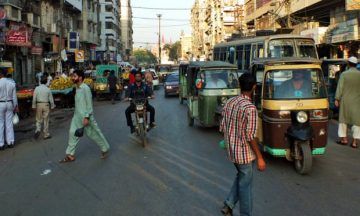Ali Bhutto in The Guardian:
 Abdullah the Cossack”, the antihero of HM Naqvi’s follow-up to the award-winning Home Boy, is the personification of Karachi’s decaying soul. The 70-year-old revels in nostalgia at the Sunset Lodge, the crumbling family estate he is at risk of losing. His was a Karachi defined by jazz quartets, Goan rockers, cabarets, theosophists, landmark synagogues and drinking Soviet delegates under the table. A self-styled intellectual, he has in the twilight of his life decided to document aspects of society ignored by historians. He notes, for instance, that in contrast to the emphasis on mourning at funerals, the death anniversaries of Sufi saints are “commemorated with song and dance until daybreak”. His observations, compiled and edited by former protege Bosco, form the narrative of Naqvi’s new novel, The Selected Works of Abdullah the Cossack. Through his protagonist, Naqvi sheds light on an older and more enlightened Karachi.
Abdullah the Cossack”, the antihero of HM Naqvi’s follow-up to the award-winning Home Boy, is the personification of Karachi’s decaying soul. The 70-year-old revels in nostalgia at the Sunset Lodge, the crumbling family estate he is at risk of losing. His was a Karachi defined by jazz quartets, Goan rockers, cabarets, theosophists, landmark synagogues and drinking Soviet delegates under the table. A self-styled intellectual, he has in the twilight of his life decided to document aspects of society ignored by historians. He notes, for instance, that in contrast to the emphasis on mourning at funerals, the death anniversaries of Sufi saints are “commemorated with song and dance until daybreak”. His observations, compiled and edited by former protege Bosco, form the narrative of Naqvi’s new novel, The Selected Works of Abdullah the Cossack. Through his protagonist, Naqvi sheds light on an older and more enlightened Karachi.
The Cossack’s deteriorating physical condition is a reflection of the city’s body politic and the problems that plague it. However, the arrival in his life of potential love interest Jugnu marks a physical and mental revival. The relationship breaks class and gender taboos: while it is clear to some of the other characters that Jugnu is transgender, Abdullah remains oblivious. Like the romance of old Karachi, which is selective in its portrayal of the past, Abdullah sees in Jugnu what he chooses.
Bosco, the grandson of a legendary local jazz trumpeter, represents the new Karachi – vulnerable and in need of a father figure, which he finds in the Cossack. Characteristic of life in the city, various escapades, such as a sojourn in rural Sindh or a rendezvous with gangsters, happen on a whim and end inconclusively. Just as Karachi’s identity and heritage are threatened by the omnipresent land mafia, so too is Abdullah at odds with his siblings over the sale of the family estate.
More here.
